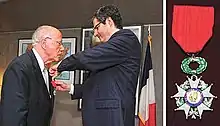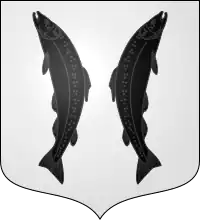Arnaud de Borchgrave
Arnaud Charles Paul Marie Philippe de Borchgrave (26 October 1926 – 15 February 2015) was a Belgian–American journalist who specialized in international politics.[2] Following a long career with the news magazine Newsweek, covering 17 wars in 30 years as a foreign correspondent, he held key editorial and executive positions with The Washington Times and United Press International. Borchgrave was also a founding member of Newsmax Media.[3]
Arnaud de Borchgrave | |
|---|---|
 Arnaud de Borchgrave receiving the Legion of Honour | |
| Born | Count Arnaud Charles Paul Marie Philippe de Borchgrave[1] 26 October 1926 Brussels, Belgium |
| Died | 15 February 2015 (aged 88) Washington, D.C., U.S. |
| Resting place | Rock Creek Cemetery Washington, D.C., U.S. |
| Nationality | American |
| Known for | International journalism |
| Relatives | Sir Charles Townshend (grandfather) Count Louis Cahen d'Anvers (great-grandfather) George Townshend, 1st Marquess Townshend (4x great-grandfather) |
| Honours | National Order of the Legion of Honour |
| Military career | |
| Allegiance | |
| Service/ | |
| Years of service | 1942–1946 |
| Battles/wars | Second World War |
| Awards |
|
Early life and family

Borchgrave was born in Brussels into the De Borchgrave d'Altena family. He was the son of Belgian Count Baudouin de Borchgrave d'Altena, later head of military intelligence for the Belgian government-in-exile during the Second World War, and his British wife Audrey Dorothy Louise Townshend. His mother was the daughter of Major General Sir Charles Townshend and his French wife, Alice Cahen d'Anvers, who was famously painted alongside her sister in Renoir's Pink and Blue. His maternal great-grandfather was Count Louis Cahen d'Anvers, a prominent French banker.[4] He was a descendant of George Townshend, 1st Marquess Townshend, through his second son, Lord John Townshend.[1]
Borchgrave was educated in Belgium, King's Canterbury, and the United States. As Belgium fell to the German invasion, he and his family escaped on a freighter, being rescued by a British destroyer after the freighter's captain had attempted to divert to Hamburg. He served in the British Royal Navy (1942–1946), from the age of 15, after running away from home, convincing his grandmother to assist in falsifying his age so he could enlist.[5] He was awarded the Médaille Maritime by Belgium.[1]
He gave up his Belgian title of nobility in 1951.[6]
Newsweek career
In 1947, Borchgrave was appointed as the Brussels bureau manager for United Press, and in 1950 he became Newsweek's bureau chief in Paris, and then its chief correspondent. In 1953, he became a senior editor for the magazine. Osborn Elliott, former editor-in-chief of Newsweek, once said:
De Borchgrave has played a role in world affairs known to no other journalist. He has been able to tap the thinking of numerous world leaders... despite his intimacy with major policymakers, he has never aligned himself with either side of a dispute.... Arnaud de Borchgrave has made significant contributions to world peace and understanding.[7][8]
As a correspondent for Newsweek, Borchgrave secured several interviews with world leaders. In 1969, he interviewed both President Gamal Abdel Nasser of Egypt and Prime Minister Levi Eshkol of Israel. In October 1972, during the Vietnam War, he secured his most famous interview, travelling to Hanoi to speak with Prime Minister and Politburo member Pham Van Dong of North Vietnam. In that interview, Dong described a provision of a proposed peace deal as a "coalition of transition," which raised fears in South Vietnam that the deal involved a coalition government and may have played a role in South Vietnam's rejection of the deal. De Borchgrave was fired from the magazine in 1980, after his increasingly far-right bent found its way into his reports, such as when he compared the Soviet invasion of Afghanistan to Hitler’s capture of Czechoslovakia before World War II. There were also rumours of him keeping dossiers on fellow employees as well as allegations of plagiarism and fabrication of news for political purposes.
Later career
Appointed editor-in-chief for The Washington Times on 20 March 1985, Borchgrave also went on to serve in the late 1990s as CEO of a much-diminished United Press International, the successor to his early-career employer, during the latter part of the agency's ownership by a group of Saudi investors. In that role, Borchgrave orchestrated UPI's exit from its last major media niche, the broadcast news business that United Press had initiated in the 1930s. He maintained that "what was brilliant pioneering work on the part of UPI prior to World War II, with radio news, is now a static quantity and so far as I'm concerned, certainly doesn't fit into my plans for the future." He sought to shift UPI's dwindling resources into Internet-based delivery of newsletter services, focusing more on technical and diplomatic specialties than on general news. The rump UPI thus sold their client list of its still-significant radio network and broadcast wire to its former rival, the AP.[9]
The following year, Borchgrave played a key role in the sale of the further downsized UPI to News World Communications, the international news media company founded in 1976 by Unification Church leader Sun Myung Moon, who was also the founder of The Washington Times for which Borchgrave had worked earlier.
After his CEO turn at UPI, Borchgrave became "Editor-at-Large" of The Washington Times and UPI, writing regular columns published by either or both and retaining associations with both Unification Church media outlets. He also served as Project Director for Transnational Threats (TNT) and Senior Advisor for the Center for Strategic and International Studies.[10][11] He was a contributor to The Globalist, a daily online magazine.[12]
According to Morley Safer's "Flashbacks", Borchgrave testified before Senator Jeremiah Denton's subcommittee in 1981 that Pham Xuan An, a Time employee and Viet Cong spy based in Saigon, "was an agent whose mission was to disinform the Western press". An denied to Safer that he planted disinformation, saying that his Viet Cong bosses thought it would be too obvious and that they preferred he feed them information instead.[13]
Borchgrave was a founding member of Newsmax Media. He also belonged to the Foreign Policy Association, occasionally appearing as a panelist in their videos and events.[14]
Arnaud de Borchgrave interviewed many heads of state, heads of government, monarchs, and key figures of the world, including his most famous one when he and UPI International Consultant Ammar Turabi interviewed Mullah Omar three months before 9/11. This interview offered significant insight for decision and policy makers globally and has been published in different print media multiple times since 2001. UPI considers it as one of its best achievements and included it in UPI's 100 Years of Excellence. This is the only interview with Mullah Omar to be conducted and published.[15]
Borchgrave was the co-author, with Robert Moss, of the best-selling novel The Spike (1980).
Plagiarism allegations
On 17 May 2012, Erik Wemple, a blogger for The Washington Post, reported that Borchgrave's columns in The Washington Times reflected his think tank work and raised questions about the originality of some of his writing, citing similarities between elements of his columns and other published material. Wemple included Borchgrave's explanations for those, but also the doubts expressed about the similarities by some of the other organizations involved.[16] Elsewhere, the news website Salon reported that anonymous Washington Times officials claimed that the paper had known about Borchgrave's plagiarism nearly a year before Wemple's investigation and had initially discontinued his column before resuming it without any disciplinary action.
Borchgrave denied the allegations and claimed that his column was suspended because he was on book leave.[17] The Washington Times then announced that Borchgrave would take a hiatus to complete work on his memoirs while the paper conducted an inquiry into his work.[18] Some of Borchgrave's latest columns were removed from the Washington Times website.[19] The Center for Strategic and International Studies also announced its own investigation of work Borchgrave had published under its name.[20]
French Legion of Honor award
In July 2014, Borchgrave was awarded a knighthood in france's the Legion of Honour.[21]
Personal life
In 1969, following two earlier marriages, Borchgrave married Alexandra Villard, daughter of the ambassador and author Henry Serrano Villard.[22] She is also a published author, including a biography of her great-grandfather, the railroad tycoon Henry Villard.[23] Borchgrave died of bladder cancer in Washington, D.C. at the age of 88.[2] He was a member of the Metropolitan Club of Washington D.C.
In media
Borchgrave has been featured on several TV and Internet shows, including Weekend World, The Bob Braun Show, The Tonight Show Starring Johnny Carson, The McLaughlin Group, Paula Zahn Now, and James Goodale's Digital Age.
He appeared as himself in a 1984 U.S. Information Agency report titled Soviet Active Measures.[24]
Publications
Books
- The Spike (1980), with Robert Moss. New York: Crown Publishers. ISBN 0517536242.
- Monimbó (1963), with Robert Moss. New York: Simon and Schuster. ISBN 978-0671508005.
Reports
- Cyber Threats and Information Security: Meeting the 21st Century Challenge (May 2001). Washington, D.C.: Center for Strategic International Studies. OCLC 46670960.
See also
References
- Mosley, Charles, ed. (2003). Burke's Peerage, Baronetage & Knighthood (107 ed.). Burke's Peerage & Gentry. pp. 3924–3925. ISBN 0-9711966-2-1.
- Roberts, Sam (16 February 2015). "Arnaud de Borchgrave, Journalist Whose Life Was a Tale Itself, Dies at 88". The New York Times. Retrieved 21 June 2017.
- Donosky, Lea. "A New Editor in D.C."Chicago Tribune, 3 July 1985. Archived from the original.
- "Arnaud de Borchgrave Awarded the Legion of Honor". Embassy of France in Washington, D.C. 21 July 2014. Retrieved 21 June 2017.
- "Arnaud de Borchgrave, Journalist Whose Life Was a Tale Itself, Dies at 88". The New York Times. 16 February 2015.
- "The Foreign Correspondent". The Washington Post. 13 May 1980.
- All American Speakers biography
- CSIS Press Release
- "UPI Radio: 40 Years of Sound". Radio World. IMAS Publishing. 1999. Retrieved 17 May 2012.
- C-SPAN Washington Journal 11 June 2007 Archived 27 October 2007 at the Wayback Machine
- CSIS.org Archived 6 October 2009 at the Wayback Machine Biography
- Author Biography, The Globalist, archived from the original on 11 May 2012, retrieved 3 May 2012
- Flashbacks, Morley Safer, 1990, St Martin's Press/Random House 1991
- Great Decisions, Ep. 3: "The Dark Side of Globalization" (2010). Foreign Policy Association.
- "United Press International – Centennial Anniversary: 1907–2007". 100years.upi.com. Retrieved 21 June 2017.
- Erik Wemple (2012). "Washington Times columnist: Originality deficit?". The Washington Post. Retrieved 17 May 2012.
- Coverup at Washington Times, Salon, 17 May 2012
- "US journalist takes 'hiatus' amid plagiarism claims". Agence France-Presse. 22 May 2012. Archived from the original on 25 February 2014. Retrieved 21 June 2017.
- "Washington Times takes de Borchgrave's recent columns offline". The Washington Post. Retrieved 21 June 2017.
- "CSIS to investigate Arnaud de Borchgrave's writings". The Washington Post. Retrieved 21 June 2017.
- "Arnaud de Borchgrave Awarded the Legion of Honor". France in the United States (wwww.franceintheus.org/). French Embassy in United States (Washington, D.C.). 21 July 2014. Retrieved 20 November 2022.
- "Alexandra Villard Married to Editor". The New York Times. 11 May 1969.
- www.maiag.com, Maia Gantcheva. "Alexandra Villard de Borchgrave". alexandravillard.com. Retrieved 21 June 2017.
- Soviet Active Measures. U.S. Information Agency, 1984.
- National Archives and Records Administration – ARC Identifier 54826 / Local Identifier 306.9798 – Soviet Active Measures – U.S. Information Agency. (1982 – 10/01/1999).